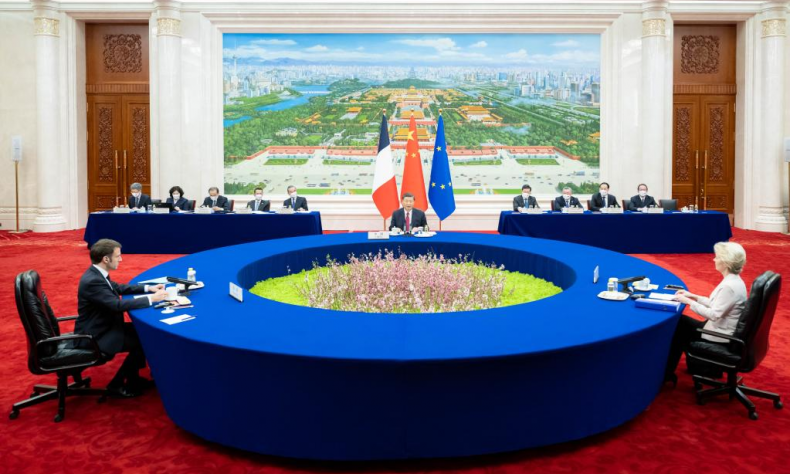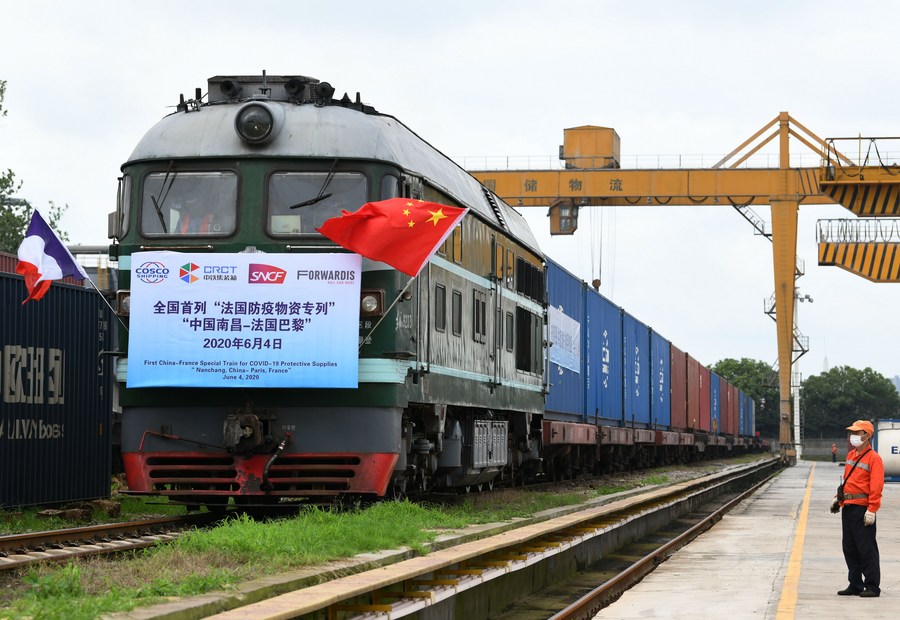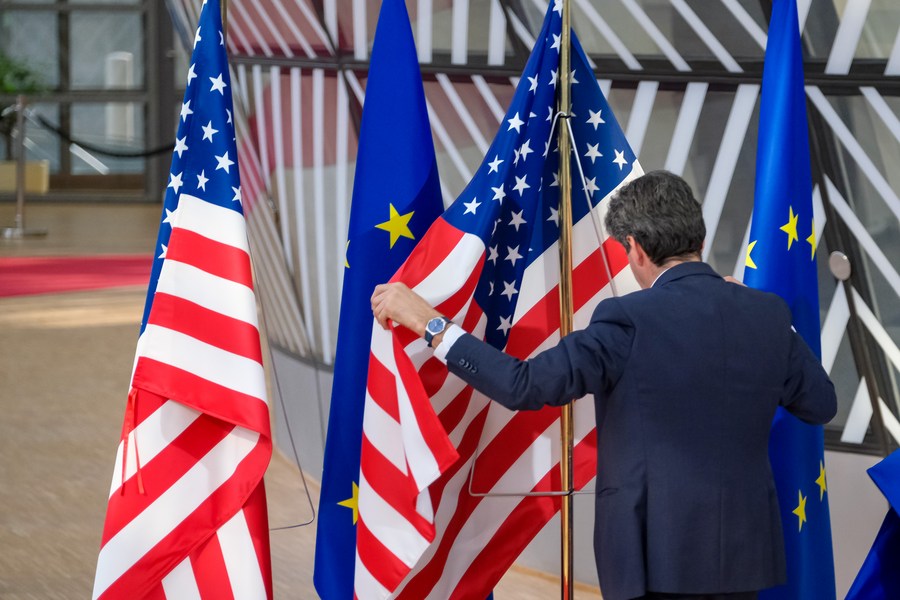A New Starting Point for China-EU Relations

In the post-pandemic era, it is the first time that Macron and Ursula von der Leyen have paid a visit to China, through which the China-EU relations are expected to make a new breakthrough and progress.
French President Emmanuel Macron and the President of European Commission Ursula von der Leyen have together paid a visit to China, following Spanish Prime Minister Pedro Sanchéz who just came to Beijing last week. In recent months, many European leaders have visited China successively. It is of great significance for improving the EU-China relations which have been under stress in the background of the Ukraine crisis and Washington’s policy of containing China.
The visit of Macron and Ursula von der Leyen is conducive to enhancing mutual understanding between China and the European Union. The China-related remarks released by Ursula von der Leyen in recent days have repeatedly aroused controversy, so it is hoped that her visit to China will contribute to overcoming differences and rebuilding political trust through face-to-face communication. Such visit has also provided an important opportunity for China, France and the EU to increase direct exchanges at various levels and in different fields, which will enhance mutual understanding and pragmatic cooperation.
The official visit facilitates the communication on major issues between China and the EU. As two of the most important actors in the world, there are a lot to discuss on bilateral and global affairs. On bilateral issues, China is the EU’s most important trading partner, so dialogues on trade and investment cooperation will contribute to the stable economic growth of both sides, especially boosting the currently stalled China-EU Comprehensive Agreement on Investment (CAI). The investment environment for Chinese enterprises in Europe has declined for three consecutive years, and the EU’s laws on key raw materials and Carbon Border Adjustment Mechanism (CBAM) have seriously hindered the investment of Chinese companies. The leaders of the two sides can take the opportunity to discuss the issues of differences and disputes, jointly promote bilateral negotiations and further implementation of the agreement. Regarding global issues, both the EU and China have the responsibility and willingness to play an important role in various areas, such as climate change, biodiversity and public health; hence, the two actors can enhance cooperation through communication, which makes for global sustainable development.

The long-awaited meeting between Chinese and European heads is of great consequence to explore the possibility of future bilateral cooperation. With regard to the Covid-19 pandemic, the Ukraine crisis, and the unpredictable international situation, both China and the EU are aware of the importance of their bilateral relationship, where there is no fundamental geopolitical competition between them. It is necessary for China and the EU to reach a consensus through communication and seek cooperation in more areas. Pressured by the United States, there exists some voices in the EU calling for decoupling from China in economy and technology. But the visit of French and EU leaders and their huge business representatives to China has demonstrated that Europe and China are continuing their economic and trade closeness, giving a heavy blow on the decoupling mongers. Undoubtedly, the closer economic relations between China and Europe will promote the recovery and high-quality development of their economies in the post-pandemic era. Furthermore, both of them need to seek collaboration in areas involving climate change, biodiversity, technology, WTO reform and alignment in digitalization.
In the post-pandemic era, it is the first time that Macron and Ursula von der Leyen have paid a visit to China, through which the China-EU relations are expected to make a new breakthroughs and progress. In order to maintain the bilateral diplomatic relationship in the right direction, the two sides should adopt more positive actions.
It is necessary for China and the EU to revoke mutual sanctions as soon as possible. China and the EU had made significant progress in CAI negotiation in 2020 and China surpassed the U.S. as the EU’s largest trading partner. However, as an ally of the U.S., the EU’s policy toward China has inevitably been affected by Washington and its worsening ties with China. The EU has imposed a series of sanctions on China in alignment with Washington, so the bilateral ties have taken a sharp turn for the worse since then. In 2022, the European Parliament approved of the ban on Xinjiang cotton and sanctions against senior officials in Xinjiang of China. China immediately announced countermeasures – imposing sanctions against 10 European individuals and four entities in response to that, saying they had severely harmed China’s sovereignty and interests and maliciously spread lies and disinformation. Recently, Netherlands has confirmed export controls on ASML lithography machines and other semiconductor equipment to China under U.S. pressure. The EU’s sanctions on China have seriously damaged the economic interests as well as political mutual trust, which directly led to the shelving of the CAI. Ambassador Fu Cong, head of the Chinese mission to the EU, proposed that China and the EU should lift sanctions at the same time for pragmatic considerations to promote the development of bilateral cooperation. He said that China is willing to consult with the EU on the principle of mutual benefit and win-win results, and China always maintains an open attitude to the EU’s proposals on the issue of sanctions.

The EU needs sufficient strategic autonomy in its diplomacy. After the collapse of the Soviet Union, the United States became the only superpower in the world, which began to strengthen its security control over Europe, and tightly bound its partners through expanding NATO’s border in Europe. With the escalation of Ukraine crisis, European countries have been closely following Washington in both policies and actions, but they have actually fallen into a dilemma. Facing with a complex international situation, blindly following the U.S. is not the best strategic choice for the EU. Former German Chancellor Angela Merkel has ever said that Europeans must take their destiny into their own hands. Now the EU needs to establish “diplomatic autonomy”, carrying out cooperation with China with a more open and pragmatic attitude, and a more objective judgment and positive understanding of China-EU relationship. With regard to the CAI, China has shown the greatest sincerity and promised to provide market access for all industries, including manufacturing, financial services, new energy vehicles, together with a transparent and legal business environment.
The EU should not be affected by the “China threat” narrative. Since the reform and opening up and entry into the WTO, China has been developing rapidly and now becomes the second largest economy in the world. The EU should realize that China has never taken the initiative to launch a war in the past 40 years, which shows that China is a peace-loving nation. Furthermore, China has always adhered to the principle of non-alignment and never seeking hegemony. On the world stage, China is always willing to promote peace just as its remarkable contribution to the significant rapprochement between Saudi Arabia and Iran recently. There are no fundamental strategic differences or conflicts between China and the EU, and the two parties have maintained close economic and trade relations for a long time. China is the EU’s largest trading partner, while the EU is China’s second largest exporter and importer. With strong complementarity, the rapid development of China will definitely benefit the EU and promote better development for both sides.
The author is a commentator of international relations and a Ph. D. Candidate of International Relations, Macau University of Science and Technology.
The article reflects the author’s opinions, and not necessarily the views of China Focus.
 Facebook
Facebook
 Twitter
Twitter
 Linkedin
Linkedin
 Google +
Google +










